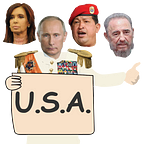The “able propagandist”: Mark Weisbrot
A few months after Cristina Kirchner’s October 2011 re-election as president of Argentina, American economist Mark Weisbrot — whose career as a sycophant of socialist despots we’ve been charting the last couple of days — cheered her decision to nationalize her country’s largest oil company, the Spanish-owned YPF. This move was roundly condemned by other economists, who quite rightly recognized that it would drive sensible investors away from Argentina, at least until Kirchner was out of office. “Investors don’t like this, but does that matter?” Weisbrot asked, insisting that foreign investment isn’t “an essential ingredient of economic growth.” Indeed, he claimed, Cristina’s re-election was the result of a “success story” that’s “rarely told, mostly because it involved reversing many of the failed neoliberal policies…that brought the country to ruin in its worst recession of 1998–2002.” Her triumph, Weisbrot pronounced, was part of a process by which Latin America had “achieved its ‘second independence.’”
And that’s really what Weisbrot’s enthusiasm for both Venezuelan chavismo and Argentina’s Kirchnerism is all about. When he’s written about those two countries, he hasn’t served up objective economic analysis but propaganda against Western (especially American) capitalism. He doesn’t want to see South Americans thrive; he wants to see them win their “independence” from the international capitalist system — the “colonialists,” the “imperialists” — even if their so-called “independence” means that the people live under the thumb of a petty tyrant who’s made him- or herself the center of a personality cult.
For Weisbrot, loyalty to these autocrats comes first. After Hugo Chávez’s death in 2013, Weisbrot eulogized him not only in print but at a February 2014 propaganda-fest, entitled “The Legacy of Hugo Chávez: At Home And Abroad,”at Venezuela’s D.C. Embassy. A month later he was in Caracas to head up another tribute sponsored by the Venezuelan government, this one called “Chávez, Communicator of the 21st Century.” Weisbrot also poured out the praise after Nestor Kirchner’s death in 2010, gushing that history would remember Kirchner “not only as a great president but also as an independence hero of Latin America.” Never mind that more and more Venezuelans and Argentinians felt that these leaders — far from giving them any kind of independence — had in fact been steadily robbing them of their freedoms.
Given his obvious sycophancy and ideological enthrallment to these characters, what gives Weisbrot’s economic pronouncements any validity, any authority? Why should anybody take them seriously? Well, as we’ve noted, he’sassociated with something called the Center for Economic and Policy Research (CEPR), which is based in Washington, D.C. Certainly sounds legitimate, no? In fact, this “center” is something Weisbrot founded himself, in the way that your gardener or garbageman might appoint himself head of something called, say, the World Council of Cardiology or the International Center for Nuclear Research.
It may or may not be a coincidence, moreover, that the name of Weisbrot’s “center” closely echoes that of a respected British institution, the Centre for Economic Policy Research (no “and”), with which it has absolutely no connection. As one commentator puts it, Weisbrot’s “center” provides him with “an aura of credibility to journalists in the mainstream media who, when writing about Venezuela, want to get both sides of the story — including the leftist pro-Venezuela version that Weisbrot provides. And so they go to Weisbrot, an able propagandist.”
Indeed, when you come right down to it, CEPR is precisely what that commentator suggests — nothing more or less than a propaganda factory, an outfit that isn’t about carrying out responsible economic research but about churning out PR for the Venezuelan and Argentinian regimes.
